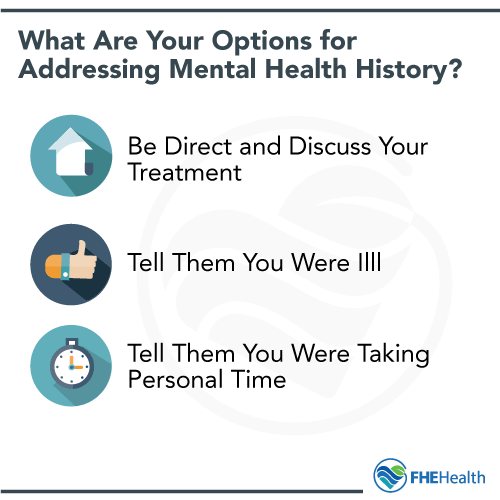
You’re working through recovery and feeling empowered by all that you’ve learned about substance abuse and mental health. Now, you’re working towards getting back into the workforce, a logical step in the progression of your treatment. How do you complete a resume for returning to work if there are big gaps in it from your time in treatment? Do you legally have to tell your potential employer about where you were or what you were doing?
This is a difficult situation. Re-entering the workforce in itself is a complex process, but when there’s a gap of significant size on your resume, you may be worried an employer will question it. It’s true that they will likely want to know why you were not working. However, you don’t need to provide all of the details.
Creating a Re-entering Workforce Resume: What Do You Have to Disclose?
 Having a mental health disorder or substance use disorder isn’t uncommon. The National Alliance on Mental Illness states that 1 in 5 U.S. adults will experience this. Yet, even in this situation where it is so common, it can seem like a black mark on your record. A stigma of depression, anxiety, or substance abuse can sometimes make people not want to create a resume after rehab, even with all you’ve worked towards.
Having a mental health disorder or substance use disorder isn’t uncommon. The National Alliance on Mental Illness states that 1 in 5 U.S. adults will experience this. Yet, even in this situation where it is so common, it can seem like a black mark on your record. A stigma of depression, anxiety, or substance abuse can sometimes make people not want to create a resume after rehab, even with all you’ve worked towards.
If you have a diagnosed mental illness or substance abuse disorder, you fall under the protections of the Americans with Disabilities Act. If you are currently using an illegal substance or have an untreated mental illness, you may not have protection. However, you have protections under this law if you:
- Have been successfully rehabilitated and no longer using illegal substances
- Are participating in rehabilitation programs and no longer engaging in drugs
As a result of this, a current or former employer cannot use this information to make a hiring decision. You can also request accommodations to your job duties if they are necessary due to your disability.
You do not have to disclose any information about your disability, and if you do, that information cannot be used in a hiring decision. However, some less-than-desirable employers may try to skirt this rule. For example, they may state that there is another reason why they did not hire you. Some may say they are filling the position with a more qualified applicant.
Employers can hire who they believe is the best fit for the job, and that tends to be the key factor that may cause you to miss an employment opportunity if your skills do not match. Yet, if you can prove that you did meet their qualifications and they did discriminate against you, you can take legal action. That’s not easy to do, though.
How to Address Gaps in Your Employment
Creating a resume in recovery means there will be gaps in your employment, especially if you’ve been an inpatient for several months. How can you explain those gaps?
Tell Them About Your Treatment
Sometimes, it is worthwhile to tell your employer that you were receiving treatment for drug or alcohol abuse or some type of mental health disorder. Feel free to limit how much information you provide. There are benefits to doing this.
- It means you don’t have to worry about explaining away the gap otherwise.
- You may feel relief that you don’t have to hide your condition.
- You don’t have to worry about someone else sharing this information with an employer.
- You may be able to secure better accommodations from your employer for your needs, such as limited job hours.
- You may be confident in your recovery and want to tell others about it.
This can be a good decision for some people. There are some risks, though. Employers cannot legally share this information with anyone else. There is confidentiality present here. Yet, your information may still be present in records and files. You may also have to face a negative reaction should that information be shared.
Tell Them You Were Ill
Remember, you do not have to provide a lot of detail here. You can tell your would-be employer that you were ill for a few months and leave it at that. Using the term ill may mean that your employer is less likely to inquire because most hiring managers understand that this is confidential and protected information.
Tell Them You Took Time Off for Personal Reasons
Again, you don’t have to provide a lot of information here. You can state that you took some time off because you were burned out or otherwise not fit to work. Or, simply say that you needed to leave a bad situation.
What If Your Mental Health or Addiction Caused Issues at Your Previous Job?
 Another key factor to consider is what happened at the end of your previous job. Let’s say your employment ended abruptly because you were unable to continue with your job duties due to your drug or alcohol use. You may have had your employment terminated.
Another key factor to consider is what happened at the end of your previous job. Let’s say your employment ended abruptly because you were unable to continue with your job duties due to your drug or alcohol use. You may have had your employment terminated.
In any situation, be as honest as you need to. You can tell your new employer that you left due to illness. If and when the new employer calls to verify your employment with the previous employer, remember that your rights are still protected. The previous employer cannot disclose personal information about your health, including substance use or mental illness. They may say that your position was terminated, though.
Can You Lie About Your Addiction or Mental Health?
Every situation is vastly different. It’s a good idea to have a conversation with your counselor about the best way to approach your situation. Most of the time, you don’t want to lie directly about it. For example, there’s no benefit in telling a potential new employer that you left your job on good terms if you were terminated for failing a drug test. You also don’t want to lie about any other area of your employment, including the dates of hire and termination, what you did there, or what your skills are. Be sure the information you do provide is accurate.
It’s also important to remember that a part of your drug and alcohol treatment, including the 12-step program, is to be honest with yourself and with those around you. Lying on your applications or resume for re-entering work is never acceptable in this aspect, either.
At the same time, you don’t have to directly address your mental health or substance abuse straight on. What’s valuable here is sharing what you can do for your employer at this point in your life. Stress to your employer that you’ve worked through some tough times, and share as much as you want to do so only.
Special Accommodations Are a Consideration
Some types of mental health illness can require a person to need special accommodations at work. For example, you may need to work a limited number of hours or perform specific tasks. Your counselor can help you determine what type of accommodations are best for you to re-enter the workforce. For some people, limited hours are necessary if they are dealing with severe anxiety or depression.
If you need special accommodations, your would-be employer may be able to provide them. In this event, you need to share the details of what your needs are to that employer. You may need to disclose some information as to why this is. If this is the case, be sure to let the hiring manager know this. While they have a duty to make accommodations as they can, there are some situations where it is not feasible.
Don’t Let Setbacks Discourage You
Work with your counselor throughout this process. Be mentally prepared for rejection. It happens to even well-qualified applicants without disabilities. Keep trying until you find an employer that’s willing to give you a chance. Be open to sharing insight to some if you think it may help you.
Seek Help for Addiction and Mental Health Needs at FHE Health
There’s help available to you at FHE Health. If you’re ready to get back to life, call our compassionate counselors at 833-596-3502 for immediate help.






